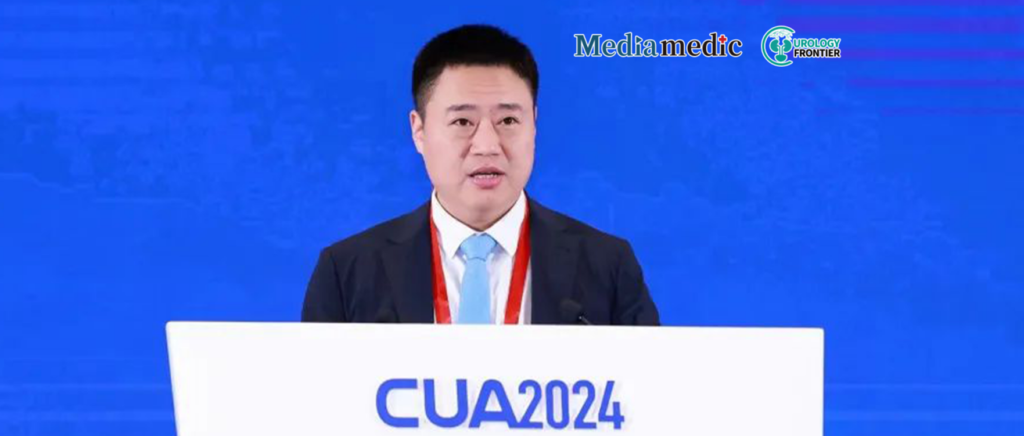
Editor’s Note: Younger, low-risk prostate cancer patients often prioritize quality of life, particularly urinary control and sexual function, leading to ongoing clinical exploration for treatment strategies that meet these demands. From September 19 to 22, 2024, the 31st Urology Academic Conference was held at the National Convention Center in Tianjin. After the conference, Urology Frontier invited Dr. Shancheng Ren from The Second Affiliated Hospital of Naval Medical University (Shanghai Changzheng Hospital) to discuss the advantages of extraperitoneal single-port robotic surgery, mastering surgical techniques, and the team's exploration of cutting-edge topics in urology.01
Urology Frontier: What are the benefits that minimally invasive prostate cancer surgery offers to patients?
Dr. Shancheng Ren: At the CUA Academic Annual Meeting, I presented a report titled “Surgical Techniques and Clinical Application Analysis of the ‘Super Veil’ Extraperitoneal Single-Port Robotic Radical Prostatectomy.” For early-stage prostate cancer patients, the goal is to achieve a “triple win”: complete tumor removal, preservation of urinary control, and maintenance of sexual function. Since 2018, our team has actively engaged in the development and implementation of the “Super Veil” extraperitoneal single-port robotic radical prostatectomy, which has now been successfully applied to over 500 patients.
Based on previous clinical data and technical evaluations, we have found that this technique ensures tumor control comparable to multi-port robotic radical prostatectomy while significantly enhancing urinary control and improving the preservation of sexual function. Currently, the “Super Veil” technique has been promoted and applied in multiple medical institutions across China, and its excellent clinical outcomes are benefiting an increasing number of early-stage prostate cancer patients, offering them renewed hope.
02
Urology Frontier: How can community-level doctors quickly master emerging surgical techniques? What insights can you share?
Dr. Shancheng Ren: Advanced techniques such as extraperitoneal single-port robotic radical prostatectomy have gradually become routine in prostate cancer treatment. Notably, many surgeons at community hospitals are also performing excellently with these procedures. To further facilitate technical exchange and sharing, our team has been hosting the “Changhai Urology Academic Livestream” every two weeks for the past six months. In each session, we carefully select and demonstrate 3–4 typical surgical cases, offering a real-time and visual learning experience. This allows community doctors to observe the entire surgical process and engage in active interaction and discussion. We believe that repeated technical practice, deep exchanges, and experience sharing are key to rapidly improving surgical skills and techniques.
03
Urology Frontier: What areas in prostate cancer treatment will you and your team explore in the future?
Dr. Shancheng Ren: I believe there are three main challenges currently facing the field of prostate cancer diagnosis and treatment. First, the accuracy of early diagnosis needs improvement. Although MRI technology has made significant progress in early detection, more precise qualitative, quantitative, and locational analyses remain a challenge. We have already initiated large-scale, multicenter clinical research using AI-assisted MRI technology in collaboration with several domestic teams. By applying advanced technologies such as deep learning, we aim to further improve the early detection of prostate cancer and better understand its development.
Second, pathological grading is crucial for guiding treatment, but discrepancies between grading results from different hospitals cannot be overlooked. Therefore, we are actively exploring the use of artificial intelligence to standardize prostate cancer pathological grading.
Third, while surgical techniques for prostate cancer have matured, challenges remain in preventing complications and promoting early recovery in early-stage prostate cancer patients, as well as exploring optimal surgical strategies for patients with locally advanced disease.
Moreover, treatment options beyond endocrine therapy and chemotherapy for advanced prostate cancer remain limited. Addressing this challenge, alongside the common issue of drug resistance, has driven our team’s research in multiple directions. On one hand, we are dedicated to uncovering the mechanisms of resistance in advanced prostate cancer to provide a theoretical foundation for subsequent treatment strategies. On the other hand, we are actively developing innovative treatments, including CAR-T cell therapy, tumor immunotherapy, and the integrated use of Chinese medicine with medicinal foods. By employing comprehensive strategies, we aim to delay the progression of resistance as much as possible, improve patient survival, and enhance quality of life.
04
Urology Frontier: What research has your team conducted in the field of prostate cancer, and what impact has it had on clinical practice?
Dr. Shancheng Ren: Our team focuses on clinical and translational research on special types of renal cancer, particularly those with specific genetic alterations, such as fumarate hydratase-deficient renal cell carcinoma, TFE3-rearranged renal cell carcinoma, SMARCB1-deficient renal medullary carcinoma, BAP1-mutant renal cell carcinoma, and NF2-mutant renal cell carcinoma. These subtypes are typically more aggressive and tend to affect younger patients, sometimes even adolescents, creating an urgent need for effective treatment options in clinical practice.
Our team has successfully completed a phase II prospective clinical trial on fumarate hydratase-deficient renal cell carcinoma, demonstrating promising clinical outcomes. The treatment regimen was explored in suitable patient groups, showing significant improvements in overall survival, from the previous 8–13 months to over two years.
Additionally, we have conducted molecular profiling on several subtypes of renal cell carcinoma, including fumarate hydratase-deficient and TFE3-rearranged renal cell carcinoma. This achievement supports physicians in developing personalized treatment strategies based on molecular characteristics, accelerating drug development for these special cancer subtypes. Research on TFE3-rearranged renal cell carcinoma is ongoing, and given the heterogeneity of this tumor type, continued scientific and clinical exploration is necessary to identify more effective treatment approaches.
We are particularly grateful for the support and collaboration from colleagues in urology across China. Currently, we have initiated three clinical trials focused on special types of renal cell carcinoma. These trials have relied not only on our own efforts to recruit patients but also on the recommendations of experts and colleagues from multiple medical centers nationwide. This collaboration has allowed us to complete patient enrollment efficiently and advance the trials with the active cooperation of both patients and doctors. Moving forward, we will need to strengthen cooperation between multiple centers across China to efficiently drive clinical exploration in urologic oncology and bring more benefits to patients.
Dr. Shancheng Ren
Professor, Chief Physician, and PhD Supervisor
Recipient of the National Science Fund for Distinguished Young Scholars and Youth Changjiang Scholar Award from the Ministry of Education. He currently serves as the Director of Urology at The Second Affiliated Hospital of Naval Medical University, Director of the Robotic Surgery Center, and Party Branch Secretary. He is the head of the national key discipline, Director of the National Center for Urology of the PLA, and Director of the Shanghai Belt and Road International Joint Key Laboratory for Urologic Oncology. His clinical focus is minimally invasive surgery and comprehensive treatment for urologic cancers, particularly prostate cancer. He has performed over 3,000 robotic surgeries, including the first single-port robotic radical prostatectomy and transperineal robotic radical prostatectomy in Asia. He was awarded the Outstanding Contribution Award for Da Vinci Robotic Surgery in China for completing over 100,000 surgeries. Professor Ren has authored and co-authored three Chinese and English textbooks and published over 50 SCI papers in prestigious international journals such as Nature Medicine, Nature Cell Biology, Molecular Cell, Nature Communications, and European Urology. He has a total impact factor of over 500, including eight papers with an IF greater than 20 and seven papers with an IF greater than 10. His work has been cited more than 2,000 times, and three of his papers are ranked as highly cited papers by ESI. He has led more than 20 national and provincial-level research projects, including the National Natural Science Foundation and key sub-projects of the National Key R&D Program, and holds 17 national invention patents, with 13 approved.
Professor Ren serves as a member of the editorial board for Chinese Journal of Urology, Executive Editor for Asian Journal of Urology (ESCI), and a member of the editorial board for Cancer Biology & Medicine (IF=4.24). He is also the Chairman of the Academic Committee of the Asian Society of Urological Robotic Surgery and Secretary-General of the Youth Committee of the Chinese Urological Association.
Professor Ren has been recognized in over 10 talent programs, including the Ministry of Education “Changjiang Scholars Program” for Young Scholars, the Shulan Medical Youth Award, the top prize for young talent in Shanghai’s healthcare system (“Silver Snake Award”), and the title of “National Leading Physician, Rising Star.”


